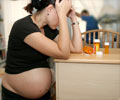Women with depression during pregnancy or with a history of depression needed to be incorporated with ways to engage their babies and understand their needs in all parenting and birth classes and health visits.

The findings of the study reveal that 62 per cent in the group of mothers with depression during pregnancy and 56 per cent in the group of mothers with a history-only of depression have lowest relationship quality compared to 37 per cent in the healthy group.
Dr Rebecca Bind, lead author and Research Associate at Institute of Psychiatry, Psychology & Neuroscience, King's College London, says: "Our findings suggest that perinatal mental health professionals should offer support not only to women with depression during pregnancy, but also to pregnant women with a history of depression, as they may also be at risk of interaction difficulties. Future research should try to understand why a history of depression, despite a healthy perinatal period, may impact the developing relationship."
This research indicates the importance of interventions for depressed mothers like video feedback classes with clinician to discuss about best behaviours to comfort the baby and structured mother-baby activities in all parenting and birth classes and health visits to improve the mother-infant interactions important for future mental health and wellbeing of the baby.
Source-Eurekalert















